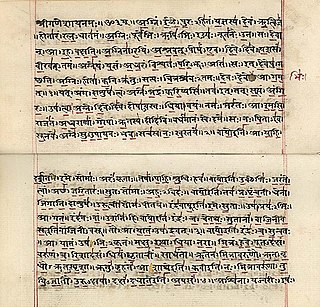Related Research Articles
Faith is confidence or trust in a person, thing, or concept. In the context of religion, faith is "belief in God or in the doctrines or teachings of religion". According to the Merriam-Webster's Dictionary, faith has multiple definitions, including "something that is believed especially with strong conviction", "complete trust", "belief and trust in and loyalty to God", as well as "a firm belief in something for which there is no proof".

Faith healing is the practice of prayer and gestures that are believed by some to elicit divine intervention in spiritual and physical healing, especially the Christian practice. Believers assert that the healing of disease and disability can be brought about by religious faith through prayer or other rituals that, according to adherents, can stimulate a divine presence and power. Religious belief in divine intervention does not depend on empirical evidence of an evidence-based outcome achieved via faith healing. Virtually all scientists and philosophers dismiss faith healing as pseudoscience.
Religion and mythology differ in scope but have overlapping aspects. Both are systems of concepts that are of high importance to a certain community, making statements concerning the supernatural or sacred. Generally, mythology is considered one component or aspect of religion. Religion is the broader term: besides mythological aspects, it includes aspects of ritual, morality, theology, and mystical experience. A given mythology is almost always associated with a certain religion such as Greek mythology with Ancient Greek religion. Disconnected from its religious system, a myth may lose its immediate relevance to the community and evolve—away from sacred importance—into a legend or folktale.

In religion and theology, revelation is the disclosing of some form of truth or knowledge through communication with a deity (god) or other supernatural entity or entities.

Shamanism is a spiritual practice that involves a practitioner (shaman) interacting with the spirit world through altered states of consciousness, such as trance. The goal of this is usually to direct spirits or spiritual energies into the physical world for the purpose of healing, divination, or to aid human beings in some other way.

A miracle is an event that is inexplicable by natural or scientific laws and accordingly gets attributed to some supernatural or praeternatural cause. Various religions often attribute a phenomenon characterized as miraculous to the actions of a supernatural being, (especially) a deity, a miracle worker, a saint, or a religious leader.
Anthropology of religion is the study of religion in relation to other social institutions, and the comparison of religious beliefs and practices across cultures. The anthropology of religion, as a field, overlaps with but is distinct from the field of Religious Studies. The history of anthropology of religion is a history of striving to understand how other people view and navigate the world. This history involves deciding what religion is, what it does, and how it functions. Today, one of the main concerns of anthropologists of religion is defining religion, which is a theoretical undertaking in and of itself. Scholars such as Edward Tylor, Emile Durkheim, E.E. Evans Pritchard, Mary Douglas, Victor Turner, Clifford Geertz, and Talal Asad have all grappled with defining and characterizing religion anthropologically.
Waheguru is a term used in Sikhism to refer to God as described in Guru Granth Sahib. It is the most common term to refer to God in modern Sikhism.
An Historical Account of Two Notable Corruptions of Scripture is a dissertation by the English mathematician and scholar Isaac Newton. This was sent in a letter to John Locke on 14 November 1690. In fact, Newton may have been in dialogue with Locke about this issue much earlier. While living in France, Locke made a journal entry, dated 20 December 1679, where he indicates that while visiting the library at Saint-Germain-des-Prés he saw:
[T]wo very old manuscripts of the New Testament, the newest of which was, as appeared by the date of it, at least 800 years old, in each of which 1 John, ch.v. ver. 7, was quite wanting, and the end of the eighth verse ran thus, "tres unum sunt;" in another old copy the seventh verse was, but with interlining; in another much more modern copy, ver. 7 was also, but differently from the old copy; and in two other old manuscripts, also, ver. 7 was quite out, but as I remember in all of them the end of the eighth verse was "tres unum sunt."
Biblical infallibility is the belief that what the Bible says regarding matters of faith and Christian practice is wholly useful and true. It is the "belief that the Bible is completely trustworthy as a guide to salvation and the life of faith and will not fail to accomplish its purpose."
The Eastern religions are the religions which originated in East, South and Southeast Asia and thus have dissimilarities with Western, African and Iranian religions. Eastern religions include:
Biblical literalism or biblicism is a term used differently by different authors concerning biblical interpretation. It can equate to the dictionary definition of literalism: "adherence to the exact letter or the literal sense", where literal means "in accordance with, involving, or being the primary or strict meaning of the word or words; not figurative or metaphorical".
The rule of faith is the name given to the ultimate authority in Christian belief or fundamental hermeneutic (interpretive) standard. It was used by Early Christian writers such as Tertullian. The phrase is sometimes used for early creeds.

The Assemblies of Yahweh is a nonprofit religious organization with its international headquarters in Bethel, Pennsylvania, United States. The organization developed independently out of a radio ministry begun by Jacob O. Meyer in 1966. The Assemblies of Yahweh is the largest sacred name group, but it is not part of the Sacred Name Movement.
The following list consists of notable concepts that are derived from Hindu culture and associated cultures’ traditions, which are expressed as words in Sanskrit or other Indic languages and Dravidian languages. The main purpose of this list is to disambiguate multiple spellings, to make note of spellings no longer in use for these concepts, to define the concept in one or two lines, to make it easy for one to find and pin down specific concepts, and to provide a guide to unique concepts of Hinduism all in one place.
This is a glossary of spirituality-related terms. Spirituality is closely linked to religion.
Soul dualism, also called dualistic pluralism or multiple souls, is a range of beliefs that a person has two or more kinds of souls. In many cases, one of the souls is associated with body functions and the other one can leave the body. Sometimes the plethora of soul types can be even more complex. Sometimes, a shaman's "free soul" may be held to be able to undertake a spirit journey.
Religious fraud is a term used for civil or criminal fraud carried out in the name of a religion or within a religion, e.g. false claims to being kosher or tax fraud.
The religious views of Thomas Jefferson diverged widely from the traditional Christianity of his era. Throughout his life, Jefferson was intensely interested in theology, religious studies, and morality. Jefferson was most comfortable with Deism, rational religion, theistic rationalism, and Unitarianism. He was sympathetic to and in general agreement with the moral precepts of Christianity. He considered the teachings of Jesus as having "the most sublime and benevolent code of morals which has ever been offered to man," yet he held that the pure teachings of Jesus appeared to have been appropriated by some of Jesus' early followers, resulting in a Bible that contained both "diamonds" of wisdom and the "dung" of ancient political agendas.

Religious texts, including scripture, are texts which various religions consider to be of central importance to their religious tradition. They often feature a compilation or discussion of beliefs, ritual practices, moral commandments and laws, ethical conduct, spiritual aspirations, and admonitions for fostering a religious community.
References
- ↑ William Howells, 1962. The Heathens: Primitive Man and his Religions New York City: National Museum of American History in Robert S. Ellwood Civilized Shamans: Sacred Biography and Founders of New Religious Movements , in New Religions in a Postmodern World edited by Mikael Rothstein and Reender Kranenborg (Studies in New Religions Aarhus University Press) 2003 ISBN 87-7288-748-6
- ↑ "Thomas Jefferson to Caspar Wistar, June 21, 1807" (PDF). memory.loc.gov. Retrieved 2021-04-13.
- ↑ An Historical Account of Two Notable Corruptions of Scripture. p. 2.